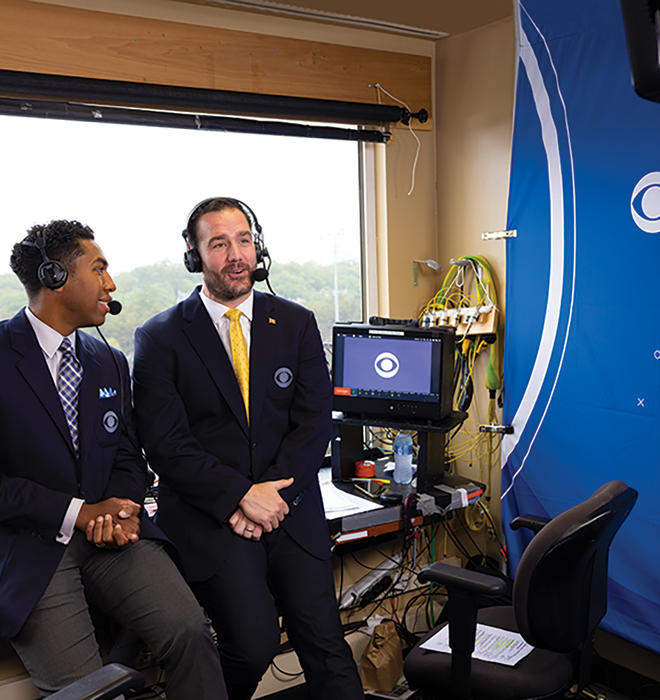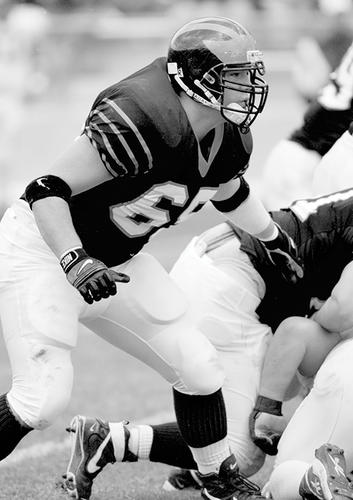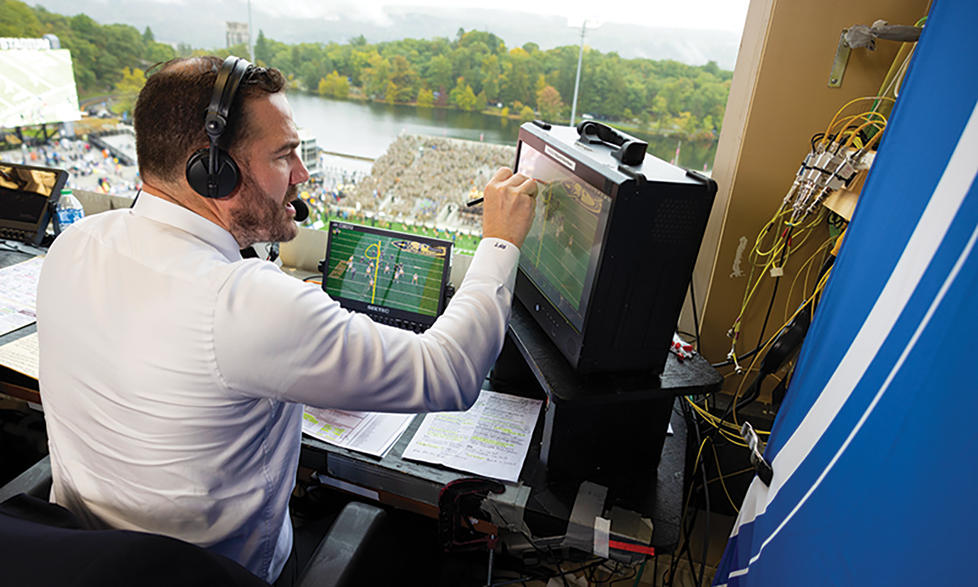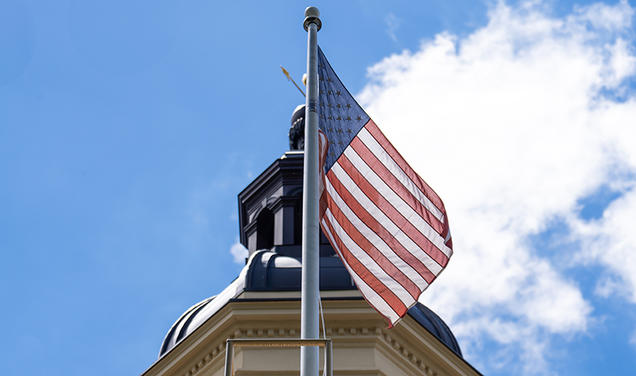
Ross Tucker ’01 Is Going Places
After years of working his way through the NFL media ecosystem, the former football player is starting to break big
Football commentator Ross Tucker ’01’s fall travel itinerary reads like the lyrics to a gridiron-themed version of “I’ve Been Everywhere.” He’s been to Philadelphia, Foxborough, Buffalo, Las Vegas, San Diego, Tuscaloosa, East Hartford, Landover, Athens, Nashville, Glendale, Pittsburgh, Piscataway … and that barely gets you to November.
In early October, Tucker was in the booth at Michie Stadium in West Point, New York, which provides one of the most picturesque backdrops in college football: 4,000 cheering cadets standing on a bank of bleachers, with the tree-covered hills of the Hudson Valley behind them. Even in a driving rain — “Ranger weather” in Army parlance — it was a compelling scene.
Tucker and his play-by-play partner, Chris Lewis, were positioned to maximize the stadium view over their shoulders as they faced the camera and sat on the edge of a press-box table, preparing for the second-half kickoff of Army’s game against Boston College.
Then the table collapsed.
Monitors tumbled, papers fluttered, a Telestrator crashed to the floor, and for a few frantic seconds, Tucker and Lewis checked with the broadcast truck to see if their audio connections remained intact.
But in a blink, they were live on the air — two stout men in sport coats and ties gently squatting to stay in frame and delivering their intros as if nothing happened.
“You know,” Tucker said, turning to Lewis during a third-quarter timeout, “a lesser broadcaster would just say, ‘No on-camera.’”
Handling the unexpected is one of many skills the 44-year-old Tucker has picked up in more than a decade and a half of broadcasting football on TV and radio (and hosting a suite of podcasts that includes nine episodes a week during the season).
This fall, he’s earned the chance to call a handful of NFL games on CBS, along with several national broadcasts of college games. After a few years spending his Saturdays working for CBS Sports Network, a cable channel, Tucker says he had to alert friends and family that he’s now on the broadcast network — “60 Minutes CBS!”
How did a Princeton politics major turned journeyman pro lineman reach broadcasting’s top tier, filling a seat usually reserved for star quarterbacks or other All-Pro players? It has a lot to do with that “I’ve Been Everywhere” itinerary. For the past 10 years, Tucker has been calling two games a weekend whenever logistically possible and treating each one like a prime-time matchup.
“It was just the reps, the volume. You get so comfortable when you do that many games,” he says. “I’m very confident in who I am as a broadcaster.”
In the booth, Tucker embodies many things, friends and colleagues say: He has a lineman’s perspective — an intricate understanding of pulling guards and pass protection schemes — but also a deep appreciation for the athleticism and strategy that give football commentators something to talk about seven days a week. He pays close attention to the rule book, knowing that not every broadcast team can rely on a former ref in the studio to share their expertise each time a controversial flag is thrown. He is relentlessly enthusiastic, whether calling a high school championship game in Pennsylvania (where he grew up and still lives) or working in an NFL booth. And he’s funny — OK, maybe dad-joke funny, but his momentary irreverence can carry a broadcast through those slow moments when every drive seems to end in a punt.
None of this is accidental, and more than anything, Tucker takes pride in his preparation. For the Army-Boston College game, he watched game film Monday and Tuesday and interviewed Boston College coaches via Zoom on Wednesday — all while prepping for a Thursday night radio gig (Chicago Bears at Washington Commanders, for Westwood One). After the Thursday game, he made a late-night drive to a Marriott near the Garden State Parkway, took a glorified nap, and arrived in West Point Friday morning to talk with Army’s coaches and players. He typed his notes and highlighted key points Friday night while watching a YouTube stream of his former high school team (Wyomissing). He revisited his notes first thing Saturday morning while working out in a hotel fitness center, making a few additions in the margins. Then, an hour and a half before kickoff, Tucker was on the field in the rain, checking in with coaches and picking up a few last-minute tidbits that would help him call the game.
That same type of preparation was one of the first things Tucker’s Princeton teammates noticed when he arrived for preseason practices in his freshman year, according to Kyle Brandt ’01, a former Tigers running back who is now a co-host of Good Morning Football on NFL Network.
“He knew everybody on the team’s name, their high school’s name, their high school statistics, their high school mascot, their high school girlfriends,” Brandt says, with only moderate hyperbole. “He knew everything as if he was going to Comic-Con to meet the Avengers, but all he was meeting was [the Princeton football team].”
Longtime assistant coach Steve Verbit, who recruited Tucker, says that his personality, competitive nature, size, and athleticism stood out. He was already 250 pounds in high school and played a de facto point guard role for the basketball team, dribbling the ball up the court.
At Princeton, Tucker earned his first start freshman year on the defensive line, but soon after that, he moved to offense. By senior year, at 6-foot-5 and nearly 300 pounds, he was a mainstay in an impressive class of Tiger linemen: Dennis Norman ’01, who was later drafted by Seattle and played for three NFL teams; John Raveche ’01, who signed as a free agent with the New York Giants; and Tucker, who also entered the pros through free agency in Washington.
Brandt played a small role in Tucker’s pitch to pro teams, filming his friend doing drills (Princeton’s “pro day” for NFL scouts was still years away). He had his doubts that the tape would have many viewers, or that teams would be interested in a second-team All-Ivy player from a team that had only won three games in his senior year.
“And then I snapped my fingers and I’m sitting in FedEx Field with my dad, watching Ross’ Washington team play my childhood team, the Chicago Bears,” Brandt says. “If you had told me that in Jadwin, when he’s doing lunges to show off that he should be in the NFL, it seems ludicrous. And that’s the best part about it.”
In 2004, Tucker had his best season as a pro, starting 13 games for a Buffalo Bills team that finished one win shy of the playoffs. But like most NFL players, he was never completely on solid ground. The next year, Buffalo released him at the end of training camp.
“I had gotten married in May, and my wife had quit her job to move to Buffalo,” Tucker wrote in a recent column for The 33rd Team, a commentary site launched by two former NFL executives. “I broke down while talking to my best friend on the drive back to our apartment. It was one thing when my failures affected me, but now it impacted others, including the woman I had just married. That bothered me as much as anything.”
Tucker soon found his next job, as a reserve for the New England Patriots, and later spent a preseason training camp with the Cleveland Browns. His career spanned seven years, a long time for any nonstarter to stay in the NFL, Verbit says, “because they’ll always find another guy that’s less expensive.”
In his final year, back in Washington, Tucker was placed on injured reserve after suffering a herniated disc in his neck during the third preseason game. Knowing he wasn’t likely to get back on the field, he joined Princeton football’s broadcast team, calling games on the radio. He also wrote a guest essay for the Monday Morning Quarterback, a Sports Illustrated website then run by longtime NFL columnist Peter King, in which he joked that he was “the only 28-year-old Princeton grad that has been fired five times already.”
King, who has been one of Tucker’s mentors, advised him to use his experiences from the sideline and locker room. After all, not many people can say they’ve played for Bill Belichick, Bill Parcells, Marty Schottenheimer, and Steve Spurrier. “You’ve been behind the curtain,” King recalls telling him. “You’ve snapped the ball to Tom frickin’ Brady! Use that — use that to your advantage.”
Tucker is fairly careful about his behind-the-scenes revelations, with a few exceptions. He once made headlines for sharing a story about Brady’s beer-chugging prowess. (Brady later swallowed a pint in one gulp on The Late Show with Stephen Colbert.)
While NFL experience may have helped Tucker get started in broadcasting, his path to CBS included plenty of modest gigs with lesser-known outlets such as Sports USA Radio, Versus, and the Pennsylvania Cable Network. He stayed in touch with contacts from a broadcast boot camp he’d attended during his playing days and built his brand through social media, radio appearances around the country, and podcasts.
“I was so happy this year that he finally got a gig on one of the network teams doing games on Sunday on television, because obviously that’s what everybody who gets into that business wants to do,” King says. “He is a classic case of a guy who worked so hard to make that happen.”
Football broadcasts typically show the inside of the booth in moments of calm — before the opening kickoff or while there is a timeout on the field. To the viewer, it looks like two or three people alone with headsets, casually talking about the game.
But when play starts, the booth comes alive, buzzing with a quiet efficiency. A statistician jots down key numbers on blank index cards — that last punt covered 36 yards, for example — to assist the play-by-play announcer. A spotter peers through binoculars and then places coins on a wide roster sheet, indicating which running backs and receivers are on the field before the snap.
As a color commentator, Tucker is primarily connected with the production crew, holding down a button to mute his microphone and discuss off-air when to use the Telestrator, a device that allows him to circle key parts of a recent play, or sharing his preference of which camera angle to show for the next replay.
From the start of his game day at West Point, Tucker spent time chatting with several of the dozens of people he’d be working with, and a few he just met along the way — a Québécois couple attending their first Army game, the woman who operates the elevator to the press box.
“It’s authentic,” says Pete Sousa, a part-time sports announcer who worked as a spotter during the Army-Boston College game. “Everybody feels seen. They’re part of the team. He does a great job of welcoming everybody.”
Tucker also checked in on his favorite Michie Stadium tailgate party, sampling pulled pork, brisket, and bratwurst, all before 9:30 a.m. He enlisted Lewis, his play-by-play partner, to shoot a video of him for social media standing next to the sizzling charcoal grills.
“If John Madden came up in this age, I feel like this is some of the stuff he’d be doing,” Lewis says.
Tom Wolfe, in The Right Stuff, famously traced the calm, folksy intercom voice of airline pilots to the West Virginia drawl of test pilot Chuck Yeager. Today’s football commentators — at least the ones who came of age in the 1980s and ’90s — seem to pull similar inspiration, consciously or subconsciously, from Madden, the former down-in-the-dirt offensive lineman and Oakland Raiders coach who, as an announcer, punctuated his calls with “boom” and “wham” (and taught the country about turduckens during his Thanksgiving Day broadcasts).
Tucker has heard people say he reminds them of Madden and calls it “the ultimate compliment,” but he’s quick to add that any similarities in style are not intentional. If there is a comparison to be made, it seems less about the “booms” and more about the approachability that made Madden a fan favorite and now makes Tucker a rising star. On social media, he takes people behind the scenes with a popular series of videos from press-box buffets, tagged #tuckspreads; his followers send back photos of their own pregame tables and invitations to future tailgates. “I don’t know why, but people love it,” he says. “It becomes, to some of them, a source of pride, or consternation, about their city. Like, if Green Bay didn’t have brats, they’d go crazy.”
Greg Cosell, a longtime NFL analyst and nephew of the late broadcaster Howard Cosell, recalls watching a Philadelphia Eagles preseason game earlier this year with his wife, who called Tucker “an easy listen.”
“I don’t think there’s anything earth-shattering to say, other than the fact that he’s incredibly prepared, he works incredibly hard, he’s got a great personality,” says Cosell, a regular guest on Tucker’s podcasts. “He is an easy listen.”
Verbit, now in his 38th season as a Princeton coach, tunes into Tucker’s weekly spot on WIP, Philadelphia’s sports radio station, during his morning commute to campus. Sometimes he’ll send a text to Tucker, offering a counterpoint to whatever he just said on the radio — and within a few minutes, he gets a text back.
To Verbit, the voice on the radio, or on the TV Sunday afternoons, still sounds a lot like the teenager he recruited more than 25 years ago.
“You can hear the love, the love of the game,” he says, “and the love of what he’s doing, with every word that comes out.”
Brett Tomlinson is managing editor of PAW.







0 Responses